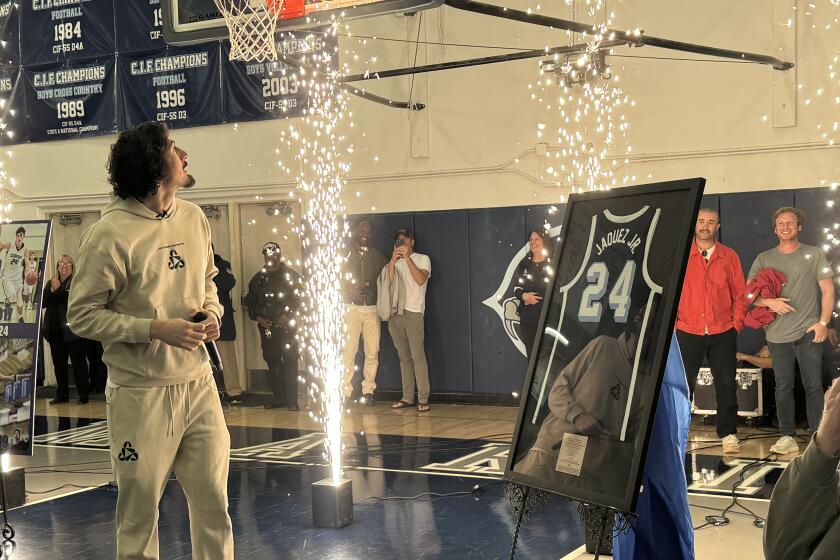Ohio State Awaits Notre Dame Return : College football: On eve of the Irish visit to Columbus, Buckeye faithful bitterly recall their dramatic 1935 appearance at Ohio Stadium in “the game of the century.”
COLUMBUS, Ohio — For 28 years, Mike Layden served as a Big Ten Conference football official. For 28 years, every time the public-address announcer gave Layden’s name over the speaker system at Ohio Stadium, the crowd booed. “A good reception,” Layden said Thursday, “but a negative reception.”
Layden, now retired and living in Indianapolis, played right halfback for Notre Dame in the most famous game ever played at Ohio State. His older brother, Elmer, one of the Four Horsemen, coached the 1935 Notre Dame team that scored three touchdowns in the fourth quarter to come back and defeat the Buckeyes, 18-13.
The teams played the next season at Notre Dame and won’t play again until today. No. 7 Ohio State (3-0) plays No. 15 Notre Dame (3-1) in a game that Ohio State fans have been awaiting since the schools announced it several years ago.
Had there been any doubt about the import of this game in scarlet-and-gray country, the Ohio State Marching Band marched over to the Buckeye practice Thursday. That is a custom normally reserved solely for Michigan week. Scalping is legal in Columbus. This week, it’s plentiful. The worst tickets are being offered for $150; the best, two for $1,000. You know what absence does to the heart. It’s been 60 years since the Irish have played in Ohio State. When they left, they left behind a stadium of broken hearts.
In a day when “Game of the Century” is applied to every match-up of top-five teams, it’s difficult to fathom the sort of spectacle that took place here 60 years ago. No less an authority than Grantland Rice, who practically invented the press box, wrote in his autobiography that the 1935 game was the greatest college football game he ever witnessed. Red Barber, who called the game for a Cincinnati radio station, agreed with Rice. In 1969, during the sport’s centennial celebration, a panel of sportswriters and sportscasters agreed with both of them.
No less a historian than Lou Holtz has studied the game in detail, starting with the train ride the Irish took from South Bend to Columbus on a Halloween Thursday night--”At 1:10 that [Friday] morning there was an earthquake that hit 15 different states,” the Notre Dame coach said. “Consequently, the train was late and in addition, there wasn’t a dining car on the train, so the players from Notre Dame arrived in a hostile mood.”
They met a hostile mood as well. Fans shouted “Catholics, go home!” at the football team. Both teams came into the game undefeated. The Associated Press poll wouldn’t be created until 1936, but the consensus seemed to be that the winner would win the national championship. “Elmer was quoted as saying, ‘Well, I guess we’ll lose by 40 points,’ ” Mike Layden remembered. “He didn’t tell us that.”
Ohio State jumped ahead, 13-0. When the second half began, Elmer Layden started his second team. The score remained 13-0 as the fourth quarter began. “[Buckeye Coach] Francis Schmidt took out seven, or maybe eight of his starters,” Mike Layden remembered. “At that time, that was it. You couldn’t get them back. There was no free substitution.”
According to Holtz, Schmidt did so thinking that fresher legs would be needed to defense the passing game. Yet the Irish scored two touchdowns, the second coming with less than two minutes to play. But Notre Dame missed both extra points. Ohio State recovered the onside kick. On first down, Irish halfback Andy Pilney hit Ohio State back Dick Beltz and forced a fumble. Notre Dame took over at the Buckeyes’ 49-yard line. On first down, Pilney ran for 30 yards but tore cartilage in his left knee. Bill Shakespeare replaced him and on his first snap, threw a pass right at Beltz. But the Buckeye dropped what would have been his redemptive interception. The next play, Shakespeare threw the winning touchdown to Wayne Millner with 32 seconds remaining. When the game ended, Irish fans tore down the goalposts at Ohio Stadium. An hour after the game, half the crowd remained in the stands.
Holtz played football at Kent State, where he was coached by Trevor Rees, one of the starters Schmidt pulled in the fourth quarter. “When I was in college and found out he played in the game, I went to talk to him about it,” Holtz said. “He got mad. He didn’t want to talk about the game. Something about the first-teamers out. He got mad and coach Rees never got mad.”
A few things have changed in 60 years. Ohio Stadium will seat about 95,000 today, including Mike Layden, who got a call out of the blue offering him two tickets at their $25 face value. Ohio State is favored and has more talent. Notre Dame must start freshman Mike Rosenthal at left tackle because starter Mike Doughty has a sprained ankle. Holtz likely won’t be on the sideline. The coach, recuperating from spinal surgery, expects to be in the press box.
There is one good Irish omen. A week after the 1935 upset, Notre Dame came out completely flat and suffered an upset itself--by Northwestern. The Irish took care of that this season. All they have to do now is upset Ohio State again.
More to Read
Go beyond the scoreboard
Get the latest on L.A.'s teams in the daily Sports Report newsletter.
You may occasionally receive promotional content from the Los Angeles Times.










